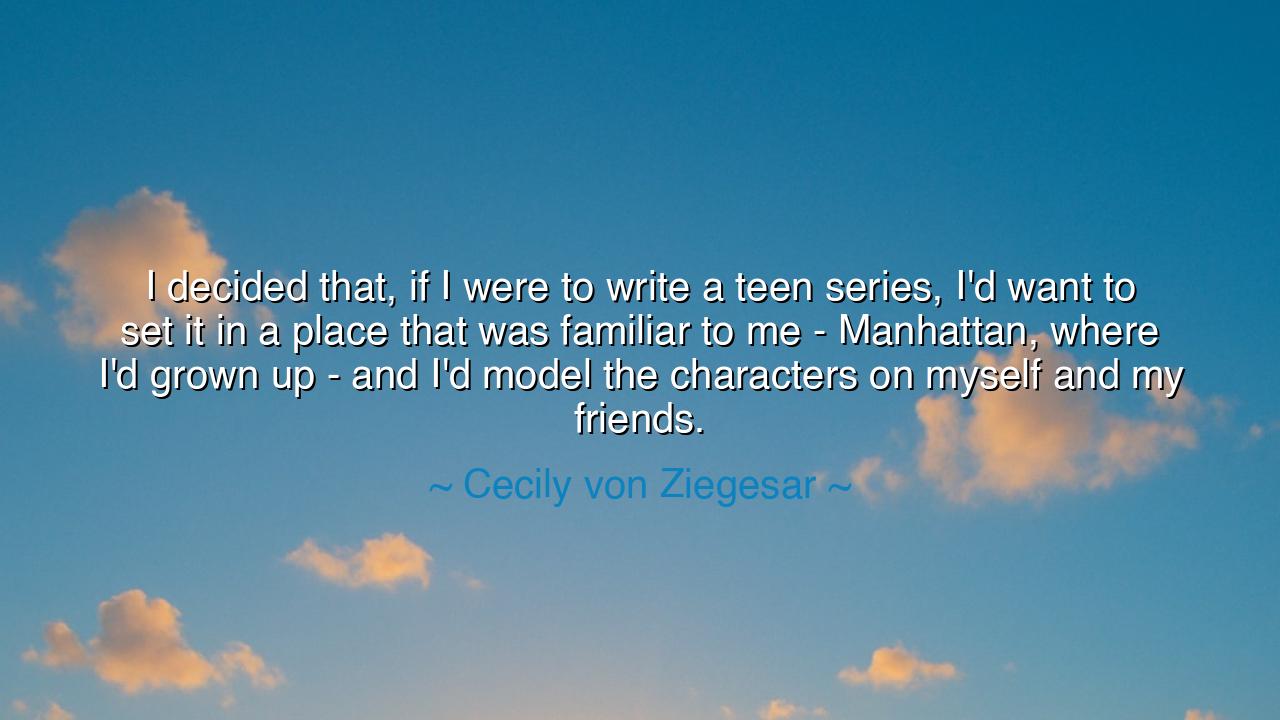
I decided that, if I were to write a teen series, I'd want to
I decided that, if I were to write a teen series, I'd want to set it in a place that was familiar to me - Manhattan, where I'd grown up - and I'd model the characters on myself and my friends.






Cecily von Ziegesar once declared: "I decided that, if I were to write a teen series, I'd want to set it in a place that was familiar to me – Manhattan, where I'd grown up – and I'd model the characters on myself and my friends." These words speak of the eternal truth that the most powerful stories spring not from distant invention but from the soil of one’s own life. She reveals that the sacred act of storytelling finds its strength in authenticity, in places walked, voices heard, and friendships lived. The familiar becomes the foundation upon which imagination builds towers, and the writer transforms memory into myth.
The origin of this statement lies in von Ziegesar’s creation of the “Gossip Girl” series, tales that captured the glitter, rivalry, and desires of privileged youth in New York City. Manhattan was not merely a backdrop for her; it was her homeland, the city whose rhythm beat in her blood. By modeling her characters on herself and her circle of friends, she infused her tales with truth. Even as fiction, they carried the weight of reality, for readers sensed that behind every glittering party and whispered betrayal stood experiences grounded in life itself.
This approach echoes the practices of storytellers through the ages. Consider Charles Dickens, who filled his novels with the struggles of the poor, the corruption of the powerful, and the vibrancy of London streets. These were not abstract imaginings but scenes drawn from his own encounters, his own childhood hardships, his own observations of the city he loved and endured. Like von Ziegesar, Dickens drew from the familiar to weave stories that would live forever, reminding us that authenticity is the lifeblood of enduring art.
Von Ziegesar’s wisdom also points us toward the deeper principle of self-reflection in creation. When she shaped her characters in the likeness of herself and her companions, she was engaging in an ancient practice: holding up the mirror of life to reveal its beauty and its flaws. In truth, every great character is born of the self—our hopes, our fears, our loves, and our conflicts. To deny this is to sever art from its deepest root. To embrace it is to let one’s own humanity become a vessel through which others may see their own reflection.
But there is also courage in her decision. For to place one’s own world upon the page is to risk exposure, to invite judgment. Yet it is precisely this vulnerability that lends power to art. By daring to write what she knew, von Ziegesar ensured that her work resonated. The readers of her tales found themselves not only entertained but confronted with the realness of human longing, rivalry, and friendship. True storytelling demands not only imagination but honesty.
For us, her lesson is clear: when you set forth to create—be it words, art, or action—begin with what you know. Do not scorn the familiar, for within it lies treasure. Your hometown streets, your family’s traditions, your circle of companions—these are not too small to matter. They are the seeds from which universes may grow. What is particular to you may, when given voice, become universal to others.
Thus, children of tomorrow, take heed of von Ziegesar’s example. Do not wait for some distant muse or exotic land to grant you inspiration. Look instead to the places you walk each day, to the friends who shape your hours, to the joys and struggles that form your heart. These are the materials of greatness. Use them boldly, weave them into your stories, your music, your work. For the familiar, when transformed through the lens of truth, becomes eternal.
And so the teaching stands: begin with your own life, and let it blossom into art. In doing so, you will not only tell your story but also awaken the stories of countless others who see themselves in your words. This is how the personal becomes the universal, how the everyday becomes immortal.






AAdministratorAdministrator
Welcome, honored guests. Please leave a comment, we will respond soon